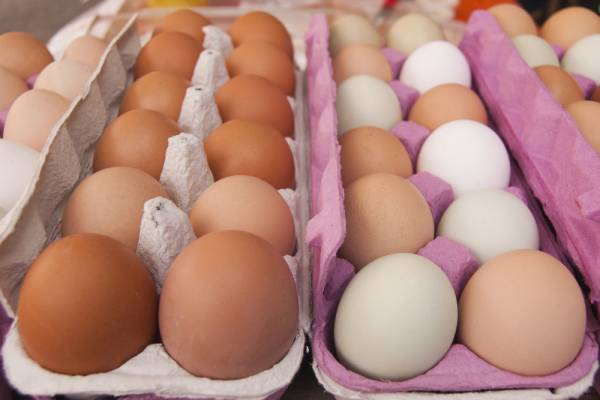We have been told for decades to limit our consumption of eggs, in an effort to avoid high cholesterol. Research is now indicating that cholesterol in the diet does not directly raise blood cholesterol levels. Eggs are actually a very healthy and important food to include in our diets regularly. They are a great source of vitamins and minerals, including some not found in many other foods, such as the fat-soluble vitamins A and D.
Egg yolks also provide the richest form of choline, which is an essential nutrient. Choline is important for brain cell development, as well as nerve and liver function. However, studies show that on average, intake in the population is less than optimal.
Although, choline is an important nutrient for everyone, it is particularly important for pregnant and breastfeeding women. The reason for this is two-fold. First, a woman’s choline stores may be depleted during pregnancy and breastfeeding, as a large volume is transferred to the fetus or infant. They need to be restored to provide adequate amounts for both mom and baby. Second, and equally as important, choline has been found to be an important nutrient in a baby’s development.
Animal studies have shown high choline diets during pregnancy improve lifelong memory function and learning ability. Breastmilk is also rich in choline and there is a high rate of transfer from mother to infant during breastfeeding. We commonly hear about the importance of folate during pregnancy to prevent neural tube defects, but choline is also an important nutrient in protecting against neural tube defects.
The best option for maintaining adequate levels of choline in the body is to regularly include choline rich foods in the diet. Most (if any) prenatal vitamins do not include choline. Liver and eggs are some of the best sources of choline. And again, choline is found in the egg yolk, not the egg white. No more bland, egg white omelets! Egg yolks have about ten times more choline than most vegetables.

I know first hand about nutrient deficiencies. I struggled with many health issues myself in the past, including severe anemia caused by a B12 deficiency. I spent several years educating myself and changing my diet in order to achieve optimal health. This included committing to a lifestyle loaded with nutrient dense foods and void of dietary toxins that contributed to chronic inflammation. For several years now, I have not included sugar, grains, and legumes in my diet, and limited the amount of dairy. I have focused on eating nutrient rich foods, like bone-broths, fermented foods, grass-fed meats, and organic vegetables. Essentially, I follow a paleo or caveman diet, with a healthy dose of Weston A. Price principles.
Knowing first hand, how much diet and nutrient deficiencies can impact quality of life and how difficult it can be to recover from these deficiencies, I wanted to ensure our baby had the healthiest start possible. I was very conscious about what I ate while pregnant and I am still very careful now, as a breastfeeding mom. I make sure to eat eggs most days, and I eat liver whenever I can – usually a few times a month. This commitment has paid off, as our baby is very healthy, rarely cries, and sleeps great. I like to attribute her calm and confident temperament to her healthy nervous system.
I can only eat so many sunny side up or fried eggs, so I needed to come up with more interesting ways of incorporating eggs in my daily diet. This avocado/egg salad is a perfect recipe for an on the go-breakfast, wrapped in lettuce for lunch, or as a quick snack. It is a very nutritious recipe for pregnant and breastfeeding moms, loaded with protein and healthy fat.
Avocado-Egg Salad Recipe
Ingredients:
- 10 eggs, hard-boiled
- 2 ripe avocados, seeded and coarsely mashed
- 1 tablespoon stone ground mustard (I usually use the Organicville brand)
- 3 tablespoons fresh lemon juice
- 1 tablespoon dill, finely chopped
- 2 tablespoons fresh parsley, finely chopped
- 1 teaspoon paprika
- salt and pepper to taste
- chopped tomatoes for garnish (optional)
Directions:
- Boil Eggs: Place eggs in a large saucepan and fill with enough cold water, so the eggs are covered, at least by an inch of two. Turn the burner on high and bring the eggs to a boil. As soon as the water boils, turn off the heat and let eggs sit for for 8-10 minutes. Immediately, run under cold water to stop the cooking process.
- Shell eggs and place in a large bowl. Add the avocado and mash with a fork, until eggs are minced and avocado is mixed in well
- Add the remainder of the ingredients to the egg and avocado mixture. Mix until mixed through. Adjust salt and pepper to taste.
- Top with fresh chopped tomatoes, if desired and serve.
References:
1. “Choline: an essential nutrient for public health”. Nutrition Reviews 67 (11): 615–23
2. https://chrismasterjohnphd.com/blog/2010/12/04/meeting-choline-requirement-eggs-organs/
Photos courtesy of Shutterstock.






